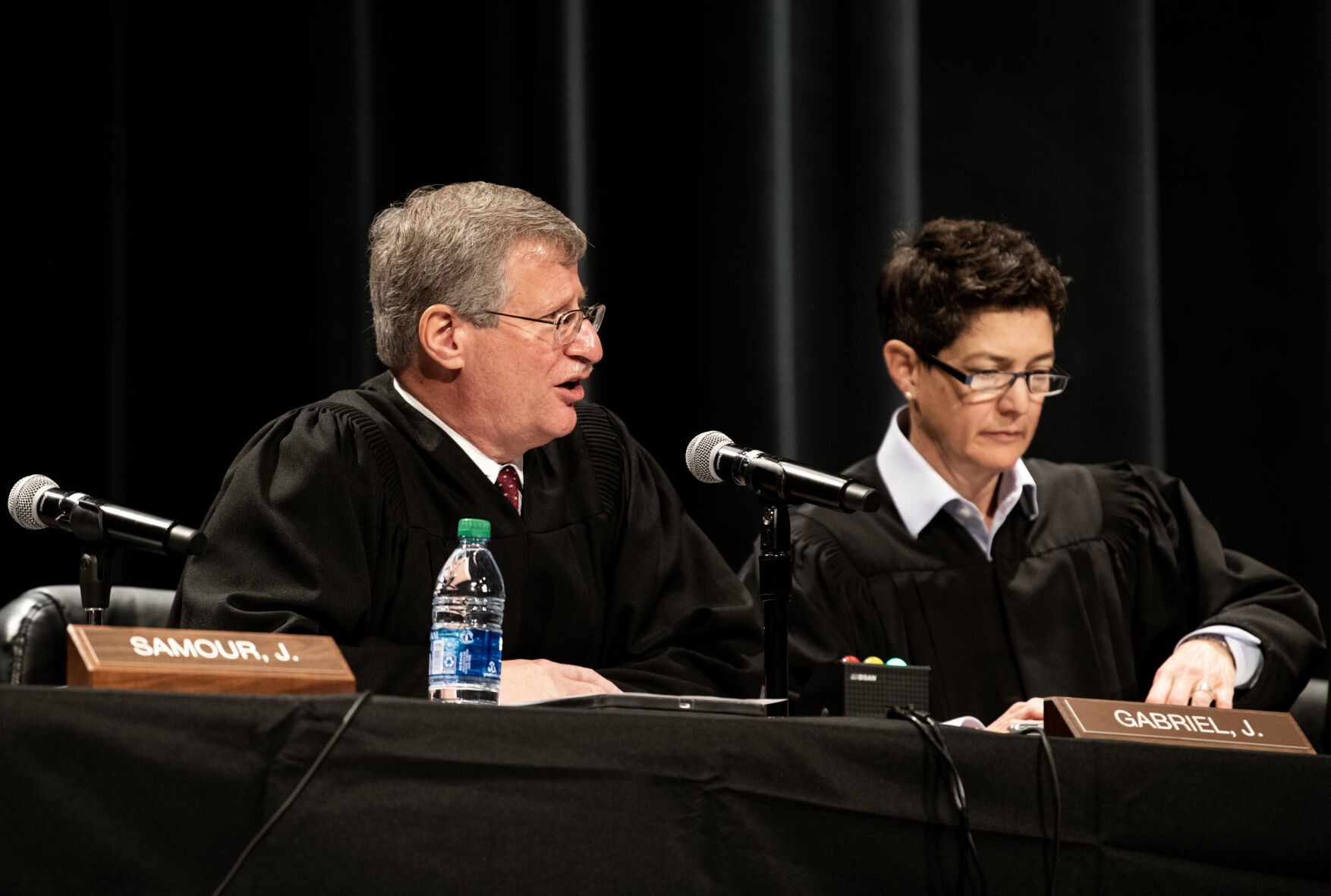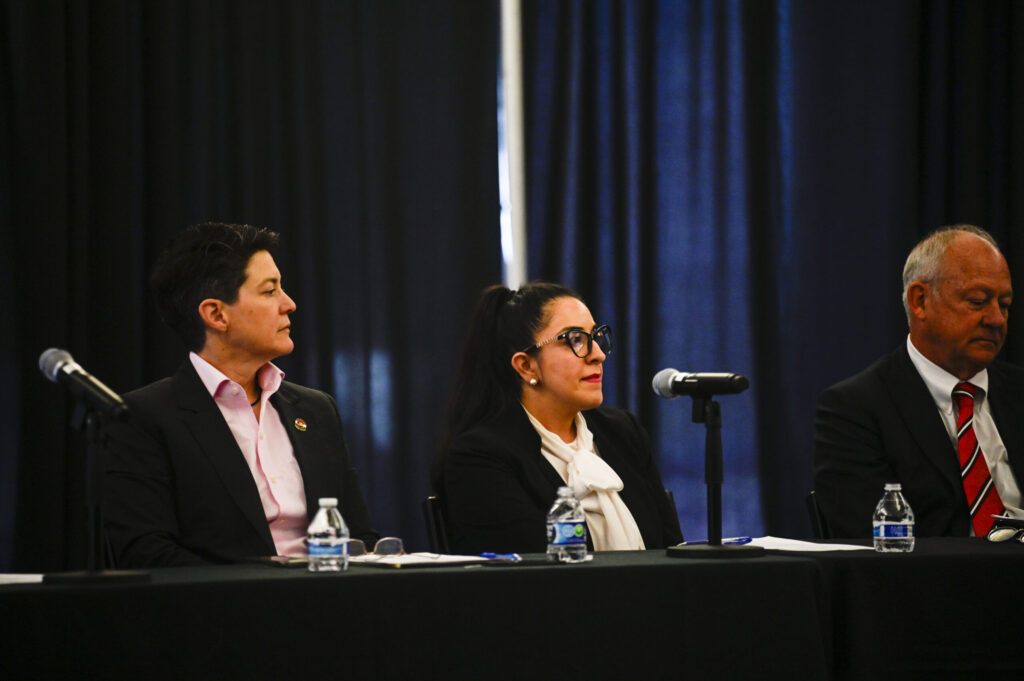Colorado Supreme Court upholds murder convictions of Sir Mario Owens

The Colorado Supreme Court on Tuesday upheld the 2008 murder convictions of Sir Mario Owens, rejecting a long list of alleged errors in one of the most high-profile criminal cases in recent state history.
Arapahoe County jurors previously found Owens guilty of the 2005 murders of Javad Marshall-Fields and Vivian Wolfe in Aurora. Marshall-Fields was a witness to a murder Owens committed the previous summer in Lowry Park and Wolfe was his fiancée.
Owens was among the handful of death row inmates at the time Colorado’s legislature abolished capital punishment in 2020. Gov. Jared Polis commuted his sentence to life in prison when the death penalty was abolished. Marshall-Fields’ mother, Sen. Rhonda Fields, D-Aurora, opposed the repeal.
Although Owens initiated his appeal to the Supreme Court under special procedures specific to the death penalty, the justices elected to retain jurisdiction over the case after its elimination. The court rejected Owens’ contention that prosecutors unconstitutionally removed two Black jurors because of their race and that the trial judge improperly allowed jurors to hear harmful testimony and copious evidence about the Lowry Park murder.
“Although the Lowry Park evidence was, to some degree, prejudicial, it was not unfairly prejudicial because a good amount of this evidence was necessary to establish the prosecution’s theory of its case,” wrote Justice Richard L. Gabriel in the Feb. 20 opinion. He added that another judge may have reached a different conclusion about how much evidence of the prior shooting was reasonable, but “the trial court had substantial discretion to decide this issue.”
“I’ve always known through the testimony and court proceedings that he was guilty. It’s just been confirmed,” Fields said following the ruling. “I’m really elated and pleased that they have confirmed what I’ve always known.”
The court’s opinion touched on multiple other issues pending before the justices. Last week, the court heard oral arguments in a different criminal case that questioned how reviewing courts should evaluate potential racial discrimination in jury selection. The state’s Court of Appeals previously concluded any race-based explanation for removing a juror is problematic, even if a prosecutor offers other, “race-neutral” reasons simultaneously.
Without explicitly overruling that decision, Gabriel’s opinion in Owens’ appeal noted the court was “unpersuaded” by the Court of Appeals’ approach.
Gabriel also referenced another pending case implicating how appellate courts should review issues that are not objected to during trial, but become clear errors while an appeal is pending thanks to changes in the law. While the justices “express no opinion” on that question, wrote Gabriel, he acknowledged the court was obligated to apply its latest evidentiary precedent to Owens’ appeal.
Alleged racial bias in jury selection
In the underlying criminal case, there was circumstantial evidence Owens shot and killed Marshall-Fields and Wolfe so that Marshall-Fields would not testify about Owens’ murder of Gregory Vann at Lowry Park in July 2004. A second perpetrator, Robert Ray, was also involved in the two sets of homicides and was convicted by jurors.
The jury questionnaire used at trial asked jurors to indicate whether they had negative experiences with police. One juror, identified as C.W., said he did on account of “driving while Black.” One of the prosecutors dismissed, or “struck,” C.W. partly because his answer “has a racial overtone.”
“That indicated a distrust of police, and police are wrongfully targeting people of that race and obviously Mr. Owens’ race,” the unnamed prosecutor said. Then-District Court Judge Gerald J. Rafferty allowed the prosecution to remove C.W. over the defense’s objection.
Immediately afterward, the prosecution struck a female juror, J.C. Although J.C. wrote on her questionnaire that she “could never vote to impose” the death penalty, her views changed during jury selection and she said she could do it after all. Rafferty found her evolution credible.
However, in what Owens’ lawyers called an “explicitly race-based line of questioning,” one of the prosecutors asked J.C. about the attitudes of “people in the Black community” towards Black defendants. The prosecutor asked if J.C. had “any feelings one way or another about the fact that Mr. Owens is a young Black man charged with a very serious crime?”
J.C. responded that she could be fair. The prosecution dismissed her because of concerns she could not apply the death penalty and Rafferty permitted the strike.
Under longstanding U.S. Supreme Court precedent, racial discrimination in jury selection is unconstitutional. When a prosecutor strikes a juror of color, the defense may raise a “Batson challenge,” named after the Supreme Court’s 1986 Baston v. Kentucky decision. A prosecutor must then provide a race-neutral reason for the strike and the trial judge will assess its credibility.
No errors found
The state Supreme Court concluded the strike of C.W. was permissible. Regardless of whether the mention of “driving while Black” was race-based, Gabriel noted the prosecution advanced other, non-racial reasons for removing him. Similarly, the prosecution appeared more concerned about striking J.C. over her concerns about imposing the death penalty.
“As for the prosecution’s questioning about the Black community’s perception of Black defendants facing the death penalty, the prosecution did not rely on that colloquy” in its strike, Gabriel wrote.
Although Gabriel, during oral arguments, appeared concerned about the several days of evidence and 33 witnesses who testified about the Lowry Park shooting — Rafferty “let in a whole lot of evidence on this other case,” Gabriel said at the time — he and the other justices felt the evidence was relevant to understanding the Marshall-Fields and Wolfe slayings.
Finally, the court concluded Rafferty appropriately declined to declare a mistrial after a key prosecution witness repeatedly said, “You know he did it” during her testimony.
“From the beginning, our team has fought to hold this murderer fully accountable for his heinous crimes,” said District Attorney John Kellner in a statement applauding the ruling.
Owens’ attorneys said they will respect the court’s decision, notwithstanding their claims of Black jurors excluded from serving, prejudicial evidence and unfair limitations on the defense.
“Our position has always been that Mr. Owens didn’t receive a fair trial before an impartial jury of his peers. The Colorado Supreme Court has decided otherwise,” they wrote. “We will continue to fight for Mr. Owens, and intend to pursue further review in the United States Supreme Court.”
Justice Carlos A. Samour Jr. did not participate in the case. Court records indicate that in his prior role as an Arapahoe County judge, he presided over one hearing in Owens’ case following his conviction. Samour’s involvement was not an issue in the appeal.
The case is People v. Owens.
Reporter Marianne Goodland contributed to this article. This story has been updated with additional comments.
















